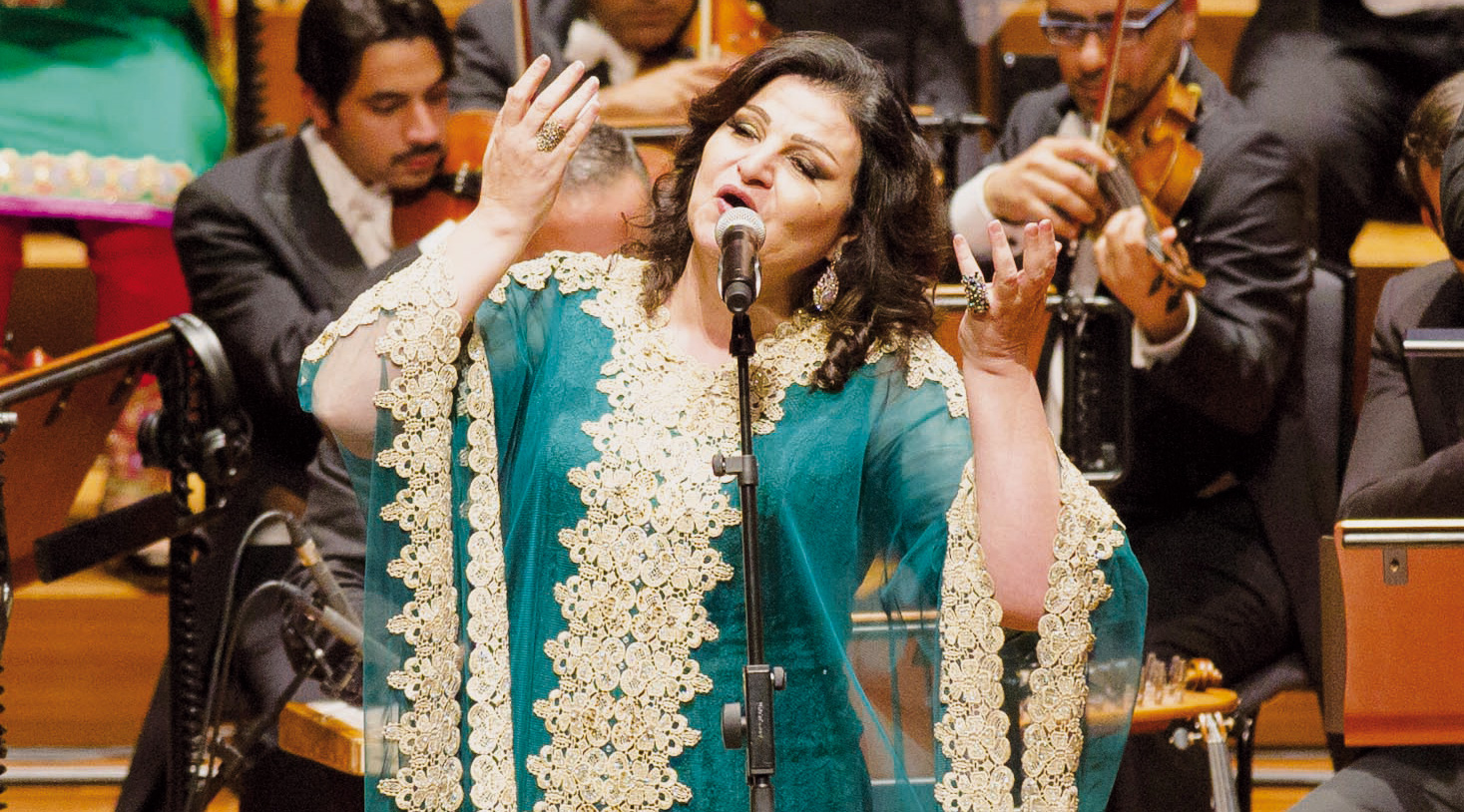

On Thursday night Arabic music lovers were treated to not one but two superstars in the world of classical Arabic song. The Royal Opera House Muscat was sold out for this remarkable concert, made more so by the Royal Oman Symphony Orchestra in its first foray into the world of Arabic music, as accompanying orchestra for the night. Opening the double-bill was the legendary Lebanese song-bird, Jahida Wehbe, dubbed “Priestess of the Stage” by adoring audiences worldwide. She brought an ensemble of traditional musicians with her to combine with ROSO, and the conductor, Andre al Hage. Jahida Wehbe has a refreshingly animated and expressive stage presence which carries an air of natural talent without production effects. She opened, appropriately enough, with ‘Sakan al Laylu’ telling of a nightingale in the vineyard under a full moon, singing an enchanted love song. Her voice is deep and well-controlled, reaching the heights of vocal technique in her ornamentation. The programme was eclectic and contrasting in every sense.
The delightful Rahbani Brothers’, ‘Rah Halfak Bil Ghosn’, imploring a sparrow to aid the wooing of a lady, was decorated with evocative bird-like flute obligatos from Mohammed Najem and ripples from piano virtuoso, Elie Maalouf – a musical collaborator who clearly has a huge influence on Ms Wehbe’s programme arrangements. In the Mawwal, “Idha Hagart”, the conductor left the stage to allow an intimate duet accompaniment between Marwan Fakir on fiddle and ROSO harpist, Laila al Mahroobi, emphasising the lonely plight of the solo singer. With Al Hage back at the helm, a backing choir of 3 vocalists sang ‘Sawt al Sahara’ with the Arabic percussionists and ROSO brass to embellish the sonorous qualities of Jahida’s alto range.

Most delightful of all was the arrangement of the famous Turkish lament, ‘Ya Habibi Taala Ilhaqni’, with its lively, almost Spanish rhythms from percussion and brass. ‘Sama Aynayk’ involved full orchestra, audience participation and a fine Buzuq solo from Elie Maalouf, as Wehbe acclaimed the seductive qualities of the beloved’s eyes. Maalouf returned with a brilliant piano solo in the much loved, ‘Mawtini’, performed as a poignant patriotic love song with just piano accompaniment, demonstrating great skill in Jahida’s versatile vocal ability. She does not have the voice of Fairouz but a smoky, almost husky timbre, requiring a microphone against the massed orchestra.
The penultimate song was a big surprise: she cleverly translated Dumont-Piaf’s “Non, Je ne Regrette rien” into Arabic with a French chorus. It led neatly to an explosive finale in ‘La Taltafet Ela Al Wara’ – an almost Arabic-Jazz style - with jazz violin riff from Fakir and Klezma clarinet from Najem. Superb Qanoon sections from Sadek Malaeb and Accordionist Joseph Sag’an gave an authentic traditional influence throughout the set and brought Ms Wehbe’s performance to a rousing conclusion.
If Part 1 was popular, Part 2 was ecstatic, with Egyptian Tarab interpreter, Ali Al Haggar. He brought his own Ensemble with him, featuring Ahmed Hamdy Ahmad on bass guitar, drummer Nasr al Din Ali and Qanoon maestro, Maged Naim Ahmed under the energetic baton of Hamdan Bin Said Al Shaely. ‘Al Mal Wal Banoon’ was an intense, classical Arab opening song with a beautiful Nay solo from Atef Abdul Hamed to explore Al Haggar’s extraordinary high tenor range. His backing chorus of 4 male vocalists featured in the well known, “Ala Ad Ma Habbina”, which already had the audience clapping along – an element which was to continue throughout Ali’s performance!
‘Lamma al Sheta Yedoq Al Beban’ was an almost filmic Ballad, featuring ROSO’s brass section, and beautiful string passages in unison. They underlined Al Haggar’s impassioned declaiming of the long love song with dramatic effect. ‘I’Tidhar’ in an almost pop-rock style used Arabic percussion and Qanoon solos, which opened several of his songs. One song in his set also featured a conductor-less flute and harp intro – ‘Arfah’ - which used traditional instruments behind al Haggar’s strong, well-placed voice in his lower range.
Between each song was a lot of friendly banter from the clearly relaxed singer, with various heckles and requests called from the audience which provided a comfortable ambience. However, he stuck resolutely to the published programme, not least because ROSO had only had 4 days to rehearse with the guest musicians from Egypt.

‘Fi Qalb al Lail’, an ode to the horses by the Egyptian Nile, opening with an off-beat rhythm, featured a fine falsetto choral backing and long string melodies from ROSO. It was followed by another tribute to the sweetheart’s eyes: ‘Dary al Oyoun’, with its fast, rhythmic bass guitar and percussion parts, soaring resonant Nay solo and wild keyboard effects, allowed Ali al Haggar’s broad range a wide scope, with long vocal phrases in this song. In contrast, ‘Gafnoho Allam al Ghazal’ opened with a bassoon intro and later an oboe solo, while keyboard jazz effects, strong ostinatos and qanoon solo riffs brought a hypnotic, entrancing quality to this famous, intoxicating love song.
The final song was unashamedly patriotic – and very popular. ‘Bawabet Al Halawany’ praises the sweetness of Egypt, and together with Qanoon, choral backing and audience participation, brought the 3-hour show to a magnificent, highly acclaimed conclusion for all present – Egyptian and others alike.
Georgina Benison
Oman Observer is now on the WhatsApp channel. Click here



